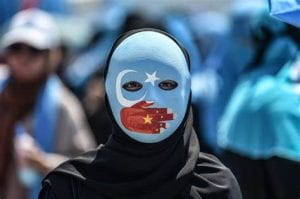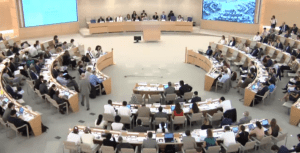China’s hardline policies in the Xinjiang region have caused a rift within the United Nations Human Rights Council (UNHRC) over the detention of more than one million Muslim Uyghurs in reeducation camps. These camps are aimed at dismantling indigenous cultures and religions for those detained. A human rights commission within the United Nations -responsible for promoting the protection of human rights throughout the world and addressing violations of human rights voted on June 10th of 2022 over a Western-backed proposal. This proposal was an opportunity to hold a debate, essentially without any monitoring of the rights situation, and it was the least intrusive measures the council could take. Member states such as the United States, the United Kingdom, and Germany proposed holding the debate. However, 19 members of the council voted against the motion, 17 members of the council voted in support, and 11 members abstained from voting. Agnes Callamard, secretary-general of Amnesty International states, “Today’s vote protects the perpetrators of human rights violations rather than the victims – a dismaying result that puts the UN’s main human rights body in the farcical position of ignoring the findings of the UN’s own human rights office.”

Council Facing Backlash
Days of diplomatic arm-twisting ensued in the UNHRC, and many national capitals in the weeks leading up to the vote as leading Western countries tried to get momentum behind a report from the former UN chief. The report, released on August 31st by the office of UN Human Rights, detailed serious human rights violations in Xinjiang that may amount to crimes against humanity. It documented a catalog of human rights violations including torture, sexual and gender-based violence, and mistreatment. According to the OHCHR report, the “extent of arbitrary and discriminatory detention of members of Uyghur and other predominantly Muslim groups … may constitute … crimes against humanity.” Despite their findings, the council still voted against addressing the conditions of the Uyghur Muslims in Xinjiang.

Background
Under China’s “Strike Hard Campaign against Violent Terrorism, Chinese authorities have violated the rights of a million Uyghurs and other Turkic Muslims by arbitrary detention, harassment, and cultural persecution since 2017. Forced sterilization and forced separation of children are some of the harshest elements of the government’s oppression. Extremist, repressive laws are put in place to target these communities for nothing more than the personal choice of practicing Islam. The disproportionate and discriminatory application towards ethnic and religious minorities is concerning. Omer Kanat of the Uyghur Human Rights Project states, “The Chinese government’s singular goal has been to silence even a discussion of the issue — we cannot allow this to happen.”

China’s Response
Beijing, strategically employing its political and economic clout, sent a report from ambassadors in predominantly Muslim regions such as Africa, Middle East, Pakistan, and Saudi Arabia positively evaluating the human rights developments to the president of the. As China continues to influence the UNHRC, people will doubt if the council can remain impartial in its proceedings. By reaching this decision, the council has planted seeds of bias and crushed the Uyghurs’ hopes that the council will stand up to China to fight for justice. Many Muslim-majority states in support of the pro-Beijing statement have effectively turned their backs on the country’s oppression of the Uyghur Muslim population in Xinjiang. Before the vote, Chinese ambassador Chen Xu accused Western countries of seeking to turn a “blind eye” to their own issues on human rights and point a finger at others. No country has a perfect history of human rights; therefore, all countries are subject to scrutiny despite how much power they may wield.
China’s Economic Lure
The more pertinent question to be asked is, how vast is China’s economic pull that other countries factor into their decision-making? The United Nations Human Rights Council (UNHRC) consists of 47 countries and is regarded as the UN’s top human rights body. Annually, council members rotate among each other. However, a prominent country like China, with a permanent seat on the council, has never been the subject of a country-specific resolution from the council since it was established in 2006. It is a vicious cycle for other countries, including the largely Muslim-populated countries that voted against the debate, as their human rights record has been attacked frequently abroad; defending China becomes a way of defending themselves. Many Muslim-populated countries sided with Beijing due to their oppression by western imperialism. For example, various military interventions by the United States in these countries under the premise to widen their influence and democratic values has resulted in a distrust of the West. Nevertheless, this decision conveys a dreadful message: China is untouchable. This should not be the case. It is up to the citizens of these UN countries to hold these countries accountable for their actions. Human Rights violations continue to run rampant in the Xinjiang region, and despite the mounting evidence and international attention, China has failed to acknowledge or address these violations. Therefore, the duty falls to us to ensure the Uyghur Muslims are heard and their issues are addressed on a global stage. To help, contact these organizations:
International Commission of Jurists

